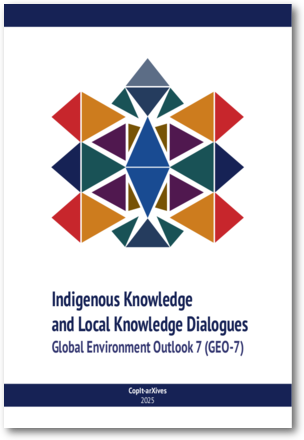
| Indigenous Knowledge and Local Knowledge Dialogues: Global Environment Outlook 7 (GEO-7) |
  |
| Home
| Google
Books | Google
Scholar | Visit us:   | Share:
| Share:
|
| |

| cover
|
This book has been peer-reviewed In the media |
Authors: Amina
Amharech, Juan Antonio Arébalo Sgró Namuncurá, Myrle Ballard, Vital
Bambanze, Yasso Kanti Bhattachan, Camilla Brattland, Benito Calixto
Guzmán, Kevin Chang, Indu Chaudhary, Hernando Chindoy Chindoy, Florence
Daguitan, Gopal Dahit, Ranjan Datta, José Gregorio Díaz Mirabal,
Nittaya Earkanna, Lena Yanina Estrada Añokazi, Alberto Feliciano
Severiano, Jesse John Lee Fleay, Paulina Garrido Bonilla, Marwa Halmy,
Enrique Hernández García, Johnson Jament, Kona Kollie, Gulvayra
Kutsenko, Lucila Cristal Laredo Domínguez, Emma Lee, Caroline
Mair-Toby, Tania Eulalia Martínez Cruz, Hanieh Moghani, Haydée Morales
Flores, Bob Muir, Nicholas Mujah Anak Ason, Philemon O. Ogieriakhi,
Frankie Orona, Jaime Armando Palma Aguirre, Jorge Oziel Pech Pech,
Vatosoa Rakotondrazafy, Estela Robles Yturbe, Francisco Javier
Rosado-May, Nicholas Rahiri Te Awherata Roskruge, June Rubis, Leslie
Schultz, Lakpa Nuri Sherpa, Saraswati Sherpa, Gladys Lorena Terrazas
Arnez, Prem Singh Tharu, Gordon John Thomas, Prasert
Trakansuphakorn, Håkan Tunon, Felipe Tuxá (Sotto Maior Cruz), Dorine
Dorcas Ngwarati Washaya, Pirawan Wongnithisathaporn, Rodrigo Yucuna. Editorial coordination: Juliana Merçon, Silvia Colmenero, Nadjeli Babinet, Karime León Sánchez and María José Zacarias. Editors Copit-arXives: Mariana Benítez and Octavio Miramontes. Published: June/2025 Indigenous people’s knowledge, local knowledge, scientific knowledge, environment. English Textos contemporaneos Catalog: SC0011ES ISBN: 978-1-938128-36-3 Al
descargar declara su adhesión a la licencia que gobierna este sitio
Yes, this ebook is FREE
Si, el libro es GRATUITO PDF: 11Mb | 203pp. |
Dialogues
between Indigenous People’s knowledge, local knowledge (IK & LK)
and scientific knowledge are often marked by both good intentions and
strong tensions. When these dialogues occur within a political
framework such as that of the Global Environment Outlook (GEO), a
dominantly scientific assessment organized by the United Nations
Environment Programme (UNEP), the complexities are multiplied by the
great diversity of perspectives, themes, agendas and ways of knowing
that are sought to be articulated. Notwithstanding numerous challenges,
the recognition of the vital role Indigenous Peoples and local
communities play in environmental governance, and the valuable insights
they offer for the construction of sustainable pathways, has motivated
“the systematic inclusion of Indigenous Knowledge into the 7th Global
Environmental Outlook” (UNEP, 2025). We hope that this book would have
a significant impact on the community of researchers interested on the
relationshpn between indigenous people’s knowledge, local knowledge and scientific knowledge. |
| Licencia Los derechos de propiedad intelectual de esta obra pertenecen al autor quién; sin embargo, autoriza al lector para copiar, imprimir y distribuir su obra libremente, en partes o completa con la condición de que (i) el nombre del autor y el título sean respetados y citados siempre, (ii) el texto no sea modificado de ninguna manera y (iii) el uso final de este texto no tenga fines de lucro. Compatible with Creative Commons Attribution-NonCommercial-ShareAlike 3.0 Unported License. 
|
| |
Visitors 3301 |
|
Universidad Nacional Autónoma de
México
Octavio Miramontes 2025
Aviso de privacidad - Privacy settings
En este sitio no se recopila ni almacena información relativa a nuestros visitantes.
No information from our visitors is collected or stored in this site.
Octavio Miramontes 2025
Aviso de privacidad - Privacy settings
En este sitio no se recopila ni almacena información relativa a nuestros visitantes.
No information from our visitors is collected or stored in this site.

